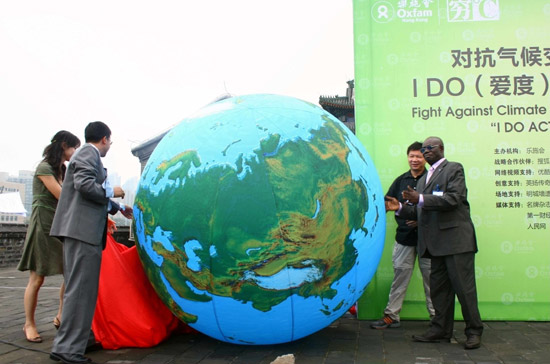The regions most vulnerable to climate change tend to be the poorest, while regions that face the least harm — and are better able to deal with the harm they face — tend to be the richest, says a new report by Oxfam Hong Kong.
 |
|
On the Chinese Calendar's hottest day, Oxfam Hong Kong volunteers were joined by representatives from embassies, media and NGOs to launch a series of activities at the Ming City Wall Ruins Park in Beijing, aiming to raise public awareness about poverty problems caused by climate change. |
The world's richest countries, having contributed by far the most to the greenhouse gas emissions that cause global warming, are splashing out billions of dollars to isolate themselves from its worst consequences, such as drought and rising sea-levels.
By contrast, despite longstanding treaty commitments to help poor countries deal with global warming, the industrial powers are giving just tens of millions of dollars to mitigate climate hazards in the world's most vulnerable regions.
The situation in China is similar: the most vulnerable areas tend to be the poorest, while the areas that face the least harm — and that are better able to deal with the harm they face — tend to be the richest.
In China, 95 percent of people living in poverty are threatened by climate change, according to the report by Oxfam Hong Kong.
Oxfam says the gap between rich and poor will grow in China as climate change takes its toll, with richer parts of the country receiving an economic boost, while many poor regions become even more disadvantaged and vulnerable.
"Climate change causes natural disasters that disproportionately affect poor people living in ecologically vulnerable areas. In China, the proportion of the absolutely poor affected by climate change reached 95 percent in 2005, and is expected to rise. So, we have to fight hard against climate change, not only for the environment, but also for the poor," said Dr. Howard Liu, the China Unit Director of Oxfam Hong Kong.
(China.org.cn by He Shan, July 23, 2009)